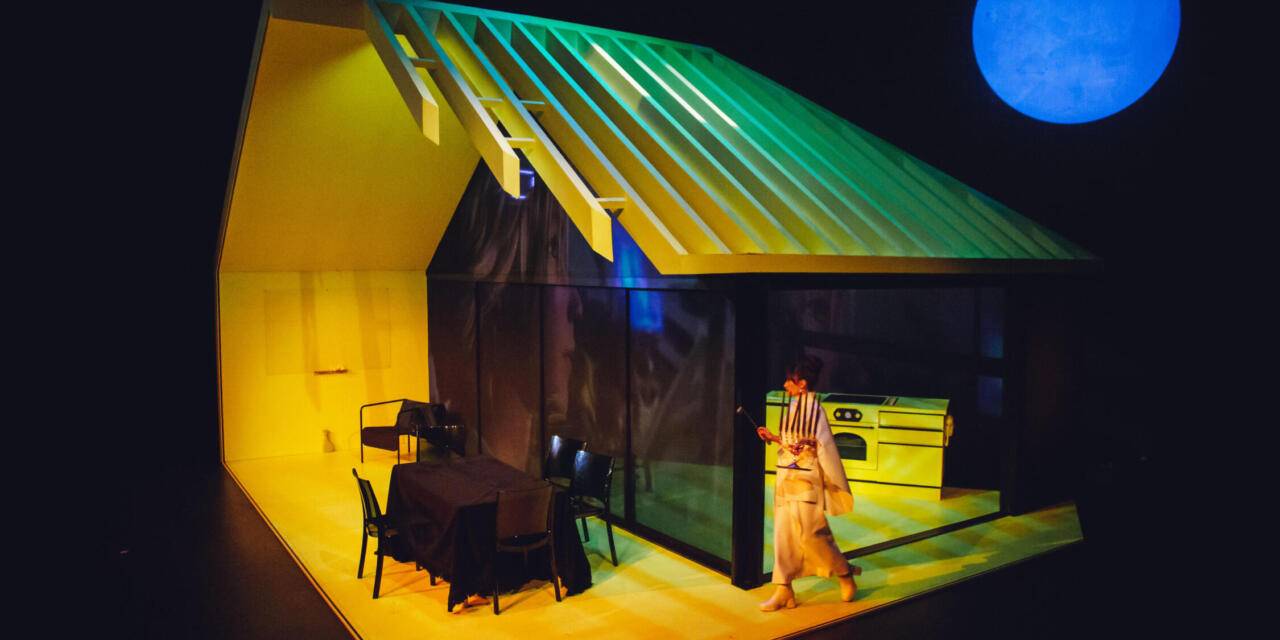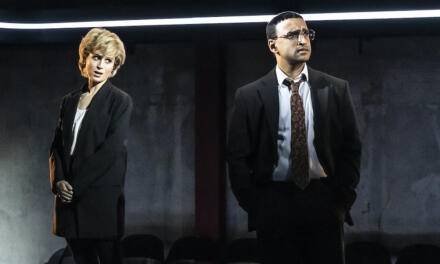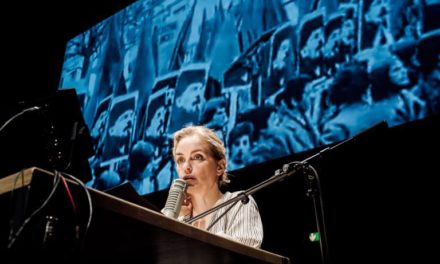There is a lot to admire in Denise Despeyroux’s newest play produced by the Centro Dramático Nacional at Madrid’s Valle-Inclán theatre. Misericordia (Mercy) is about how we look back at the past, how to avoid meta-theatricality being vacuous and what it means to try, and make a living in theatre in a post-Covid world. The core idea is simple without being simplistic. Darío Duarte (knowingly played by dramatist-director-actor Pablo Messiez) has his first big house commission from the Centro Dramático Nacional – Spain’s national theatre — and is searching for a topic and treatment that will make an impact. Confiding in his close friend Dante (an engaging Cristóbal Suárez) – who has given up a relatively successful career as a dramatist to set up a self-help business, replete with one to ones, you tube videos and an array of explanations for dietary fads — he is mining his own past for inspiration. He decides to look back at his own journey as part of the Uruguayan exodus to Spain following the 1973 military coup. With his father imprisoned, his mother fled to Spain with Dario and his elder sister. Then in 1983, Spain’s then Prime Minister, Felipe González, chartered a plan to take close to 200 children – descendants of political prisoners and exiles — to Uruguay to spend Christmas with their families. Darío, four at the time, was on that plane but can no longer remember the trip. So begins a journey to find out what happened and how this might make engaging theatre.
The core of the play concerns Darío’s relationship with Dante, and his sisters Delmira and Dunia. Delmira (a sharp-tongued Natalia Hernández), a practising psychoanalyst, has embraced the family’s Jewish roots and insists on full family participation at all religious festivities. Dunia (Marta Velilla) is a video game designer who finds solace in a hermetic existence as closed and controlled as that of her most celebrated game, Final Fantasy X. She dresses like one of her creations, Yuna, a warrior who has the agency that Dunia cannot muster. Dante comes in as the outsider, the audience surrogate who witnesses both the tensions and asks the questions the family can’t pose.
Alessio Meloni provides a playful set, a playhouse of sorts in black and yellow where the characters act out their roles. Gauze operates to separate out the discrete rooms where the characters seek refuge – Dunia in her upstairs studio; Delmira in the kitchen preparing Jewish dishes that never seem as good as they should. A screen on the wall of the house allows both the past and the wider present to intrude on the siblings’ life. There is footage of protests against the Uruguayan military regime in the 1970s, video interventions from the present from prominent dramatists, including the author playing a version of herself. Autofiction — fiction that draws on the author’s life — becomes not just an idea argued through by Darío and Dante but the genre of the piece itself.
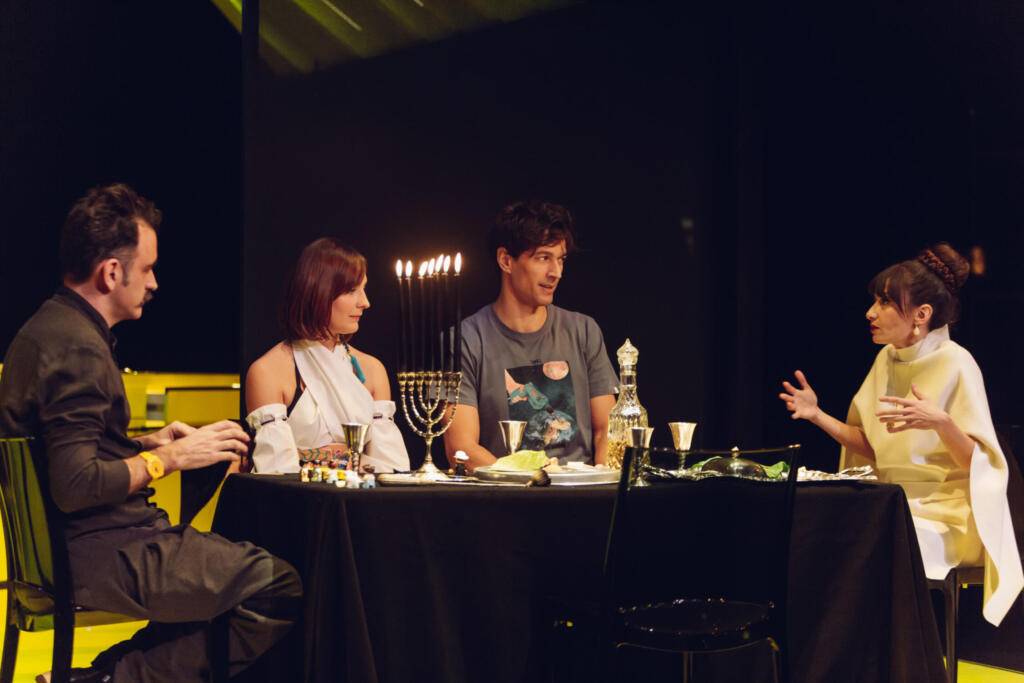
Making sense of the past – the siblings and Dante at dinner. Photo: Geraldine Leloutre
There’s much fun in the insider jokes about the Madrid theatre establishment and the wider milieu that Darío and Dante are part of. The Franco-Uruguayan playwright Sergio Blanco appears onscreen as a charismatic reference point – someone whose approval Darío craves but which constantly evades him. Pablo Messiez is mentioned by Darío – a moment that gains knowing laughs from an audience that recognizes the renowned Argentine actor-writer-director in the role of Darío. Andrés Lima and Pablo Remón — both figures commissioned by the CDN — are also mentioned, as is leading Argentine dramatist, actor and director Rafael Spregelburd. It’s a very masculine world that Darío references. Despeyroux is the exception; she is contacted by Darío on Sergio Blanco’s recommendation. There’s a witty reference by Darío to Denise Despeyroux’s comedies as having philosophical pretensions that is greeted by knowing audience laughter. Despeyroux appears also both as a character both on- and off-screen. Onscreen, she is seen as a child in a yellow dress interviewed by an Australian journalist when visiting her grandmother in 1983 and as a middle-aged woman navigating Darío’s appeal for assistant. A very funny sequence has her finding numerous different ways to evade meeting him but in the end she acquiesces. Offscreen, when she meets with Darío, she advises him to avoid the autofictional approach that the play so evidently deploys.
There’s a playful element to the action – Denise and Darío both have shoes and clothes that colour coordinate with the yellow of the house. Dante’s obsession with psychoneuroimmunology and the return to a way of life that he perceives lost is filled with ropey contradictions that amuse and entertain in their illogical nature. At one point the characters all become entities in Dunia’s video game – a lovely idea that isn’t quite visually accomplished in its resolution. Ultimately, this is a play about unhappy families and the secrets that they hold. It asks probing questions about how we make sense of the past, how we remember, and what the boundaries are that govern how we write both about our lives and those of our families. And there’s a lovely moment where Denise as an adult looks back at her childhood self on the screen, only the adult still carries the child she once was; it remains part of her contemporary identity.
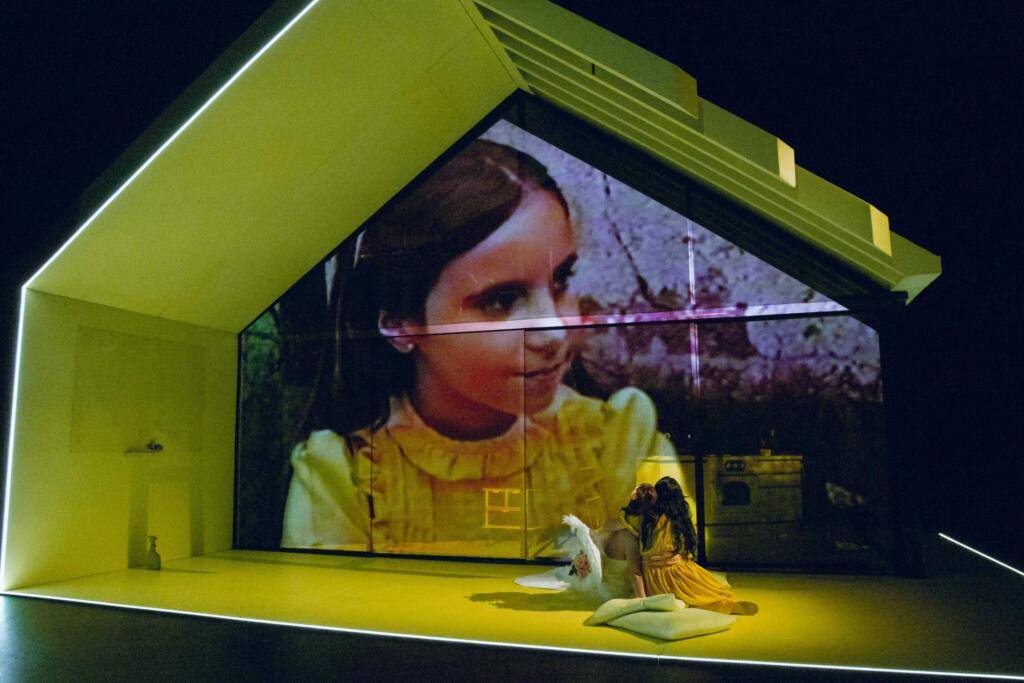
Past and present in dialogue in Misericordia (Mercy). Photo: Geraldine Leloutre
There are no answers here, simply a set of metatheatrical questions tackled with droll humour. And while the play would have benefited from tighter editing, its broader conceits feel pertinent and timely. Despeyroux directs her own writing with a lovely attention to the absurdities of the dialogue; humour abounds. The cast give engaging performances. Natalia Hernández captures Delmira’s poise, elegance, and neurosis. Marta Velilla gives form to Dunia’s awkwardness and growing obsession with Dante. Cristóbal Suárez finds a way of melding Dante’s carefree qualities with an obsessive trait that never knows when to let go. And Pablo Messiez’s Darío is wracked with self-doubt rooted in his own position as an exile with a trauma that remains all too raw. Denise Despeyroux isn’t afraid to poke fun at herself, giving herself a secondary role in a piece that takes its name from the boat that brought her family to Spain in the mid-70s. Theatre cannot provide a solution to the loss Darío suffers, but it might offer a way of making sense of it. Whether that can be done without bringing further pain to all concerned remains a key question for the audience to ponder at the play’s end.
Misericordia plays at the Teatro Valle-Inclán of the Centro Drámatico Nacional Madrid from 19 January to 25 February 2024
This post was written by the author in their personal capacity.The opinions expressed in this article are the author’s own and do not reflect the view of The Theatre Times, their staff or collaborators.
This post was written by Maria Delgado.
The views expressed here belong to the author and do not necessarily reflect our views and opinions.

